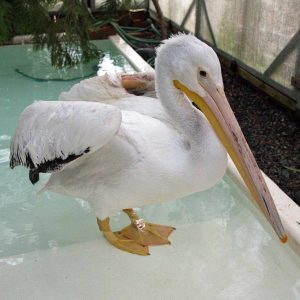
The following story was shared with us by the Wildlife Rescue Association in British Columbia, Canada.
In October 2019, an endangered American white pelican arrived at Wildlife Rescue Association in Burnaby, B.C., Canada. The pelican was separated from its migratory flock who travel from their breeding grounds in Williams Lake, B.C., to find warmer climates in California and Mexico in the winter months.
Wildlife Rescue sent two experienced volunteers on a 4.5-hour drive to Oliver, B.C., to capture the lone pelican from Tuc-El-Nuit Lake, a yearly pit stop for this endangered species.
Once the pelican arrived at Wildlife Rescue, staff and veterinarians discovered the pelican had extensive tissue damage on the left wing, a large laceration on the patagium (fold of skin at the front of the wing) and multiple puncture wounds showing entanglement from a suspected fishing line and hook. The pelican showed signs of dehydration and was underweight with a low body condition and an infection.
The road to recovery would be long and require special treatment.
Because of the time of year and severity of the wounds, the pelican became a long-term patient over the winter at Wildlife Rescue. The treatment plan included daily wound management, physical therapy, pain control, and adequate nutrition. A blood test revealed the pelican had a low total protein, showing nutritional support was of utmost importance. To help raise his total protein and increase his weight, staff started tube-feeding with EmerAid Intensive Care Piscivore twice daily.
When tube-feeding a pelican, staff must insert the syringe, tube, and arm down into the pouch of the pelican, ensuring the tube is deep enough to reduce the chances of regurgitation. This process can become an irritant for the animal. Staff needed to figure out a less invasive method of feeding. This is where the fish came in, and the staff got creative. We sliced open multiple herring each day and filled them with EmerAid IC Piscivore. These were then force-fed to the pelican and slid down his throat. No more irritation!
The pelican has since gained weight and his wounds are healing. Wildlife Rescue still offers EmerAid IC Piscivore in fish to keep up a healthy diet. We expect Peli to stay with the Wildlife Rescue Association until the spring when he will be returned safely to his flock, this time with the ability to join the migration south.

